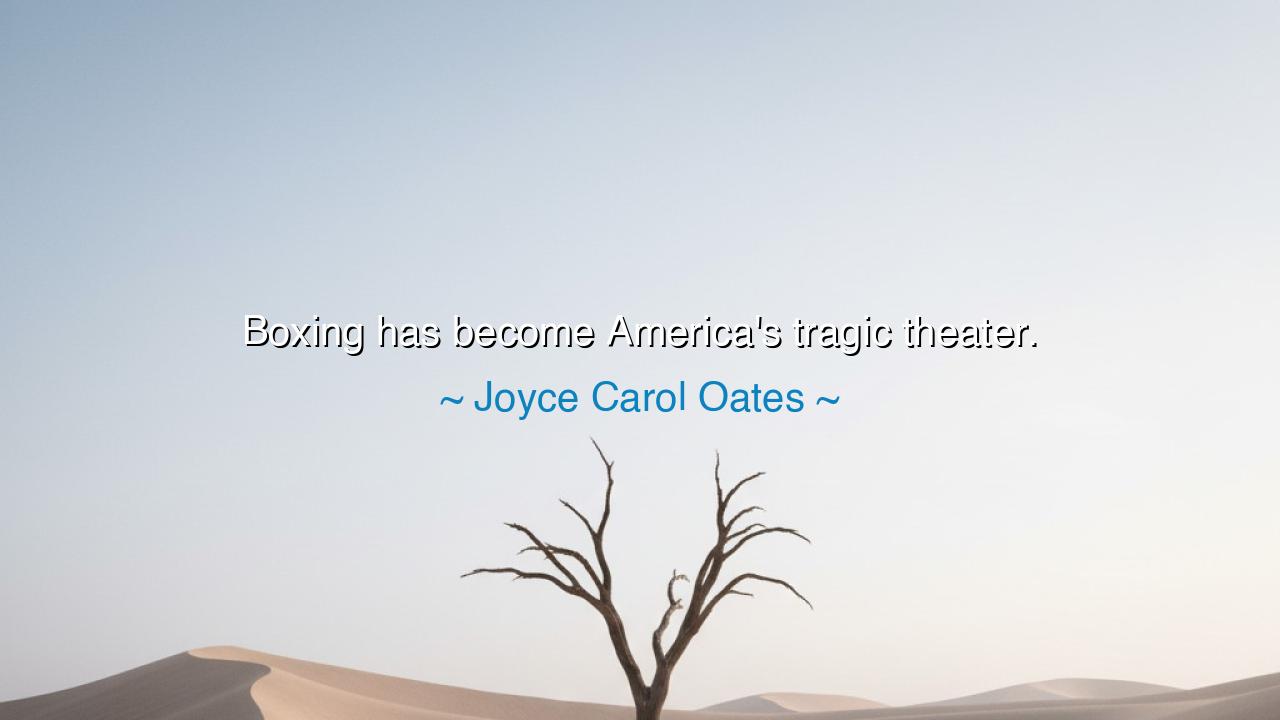
Boxing has become America's tragic theater.






Hearken, O seeker of wisdom, to the solemn words of Joyce Carol Oates, who proclaimed: “Boxing has become America's tragic theater.” In this declaration lies a meditation upon the dual nature of spectacle and suffering, of glory intertwined with ruin. Boxing, once a test of valor and skill, now stands as a mirror to the frailties and excesses of humankind—a stage upon which triumphs are fleeting, and the theater of conflict is tinged with sorrow and moral complexity.
From the earliest days of human contest, combat has always reflected the human condition. The arenas of Rome, filled with the clash of gladiators, were both sites of awe and of sorrow, where the crowd’s thrill intertwined with the fragility of life. Oates’ observation is the modern echo of this ancient truth: boxing, like the Roman spectacle, draws crowds to witness struggle, courage, and suffering, transforming personal endeavor into public drama—a theater in which the human spirit is tested and exposed.
The tragedy of this theater is perhaps most visible in the lives of the fighters themselves. Consider Muhammad Ali, the greatest of his generation, whose brilliance in the ring dazzled the world. Yet behind the spectacle lay profound sacrifice: countless blows endured, both physical and emotional, and the long shadow of Parkinson’s disease that would later afflict him. His story exemplifies Oates’ meaning: the theater is grand and inspiring, yet tinged with the inevitability of human cost, of tragedy interwoven with triumph.
Oates also gestures toward a broader reflection upon society. America, captivated by spectacle, often elevates its champions while ignoring the human toll exacted in pursuit of entertainment. The crowds cheer as gloves clash, yet few ponder the enduring consequences for those who fight. In this, boxing becomes a mirror of the nation itself: the pursuit of glory often masks underlying struggle, pain, and the ethical dilemmas of how society engages with human effort as theater.
History offers countless examples of this tragic theater. Jack Johnson, the first African-American heavyweight champion, confronted both rivals in the ring and the corrosive weight of prejudice outside it. His triumphs were celebrated yet scorned; his victories became scenes in a drama shaped as much by society as by skill. Here, Oates’ words resonate deeply: the theater of boxing is tragic because it reflects not only the courage of individuals but also the failures and obsessions of the larger society that witnesses them.
Yet even within tragedy, there lies a lesson for the attentive soul. The courage of fighters—the discipline, the resilience, the refusal to surrender—teaches that dignity is forged not only in victory, but in enduring struggle. The theater may be tragic, yet it also illuminates virtues: perseverance, courage, and the relentless pursuit of excellence, even in the face of inevitable pain and loss. To witness or participate is to confront the depth of human resilience.
Therefore, let this wisdom guide your life: honor effort without glorifying suffering, seek excellence without courting ruin, and perceive both spectacle and toil with discernment. Set practical actions: cultivate resilience, act with integrity, respect the limits of your own and others’ strength, and reflect upon the cost of achievement. Like the fighters in Oates’ tragic theater, engage fully, yet with awareness of consequence, tempering ambition with prudence.
Walk forward, O listener, with eyes attuned to both the glory and the cost of human endeavor. Let boxing as America’s tragic theater remind you that all striving carries weight, that triumph is inseparable from sacrifice, and that the theater of life demands courage, reflection, and compassion. In this understanding, you honor both human effort and human dignity, standing wise and vigilant before the stage upon which all souls contend.






AAdministratorAdministrator
Welcome, honored guests. Please leave a comment, we will respond soon